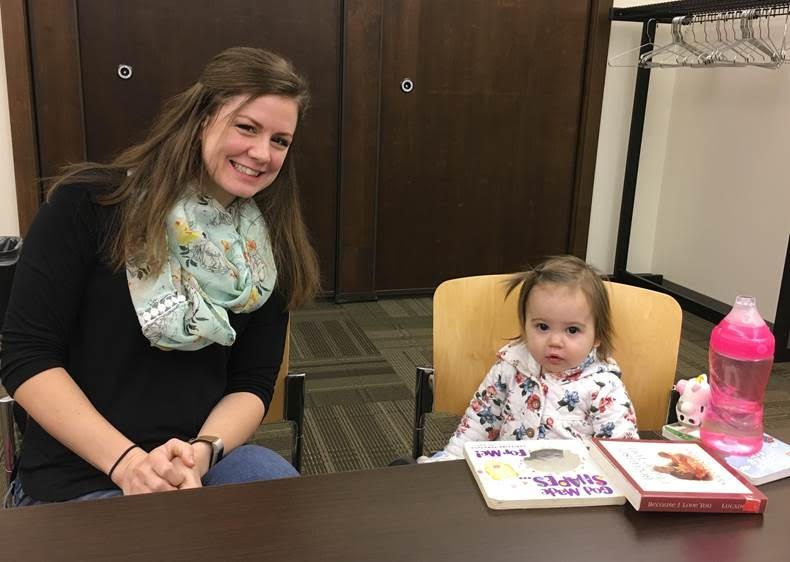|
Helpful hints for kids, elderly, and everyone else
Spectrum Health provides tips on keeping the elderly safe in the extreme cold Most healthy adults can feel when their hands/feet are getting too cold and take appropriate measures to stay warm. Older adults with neuropathy may have difficulty feeling this, and therefore are more susceptible to frostbite. Older adults also lose body heat much quicker than younger adults and this makes them much more susceptible to hypothermia. 5 tips to keep older adults safe in the extreme cold: · Wear warm coats and well insulated socks, gloves and hats when you are out and about. · Make sure thermostats are set to 68-70 degrees Fahrenheit. · Dress in layers. Wear a sweater even while indoors and wear socks with non-slip grips. This will help minimize heat loss and reduce the risk of falling. Wear long underwear or warm pajamas while sleeping as well. · If you have an elderly neighbor, family member or friend that is living alone, check on them. Check to make sure the furnace is working and that they are stocked up on food and supplies. · Limit time spent outdoors. It does not take long in these extreme temperatures for hypothermia and frostbite to set in. Warning signs of hypothermia: cold feet and hands that can be prickly or painful, puffy or swollen face, pale skin, shivering, slower than normal speech, acting sleepy, being angry or confused, moving more slowly, slow and shallow breathing, and loss of consciousness. Please call 911 if you believe someone is suffering from hypothermia. Helen DeVos Children’s Hospital provides tips to keep your family safe in the extreme cold With a layer of fresh snow on the ground, children will certainly want to play outside. However, with extreme cold temperatures and wind chills, parents need to know how to prevent dangerous cold weather exposure and be ready to respond appropriately at the first sign of problems. Top tips to keep your kids safe: CAUTION: When the temperatures drop as low as are expected, most schools say -20 wind chill or colder, “the best advice is to keep your children inside and busy with indoor activities,” says Hoekstra. Clothing: Problems arise when infants and children are not dressed properly. They should be dressed in several thin layers to stay warm and dry. Adequate outdoor clothing includes thermal long underwear, turtlenecks, at least one shirt, pants, sweater, coat, warm socks, boots, gloves or mittens and a hat. Hypothermia: This condition develops when a child's temperature falls below normal due to exposure to cold. It often happens when children are playing outdoors in extremely cold weather without wearing proper clothing or when clothes get wet. As hypothermia sets in, the child may shiver and become lethargic and clumsy. A child’s speech may become slurred and body temperature will decline. Call 911 immediately if you suspect your child is hypothermic. Until help arrives, take the child indoors, remove any wet clothing and wrap him or her in blankets or warm clothes. Frostbite: This condition happens when the skin and outer tissues become frozen. This condition tends to happen on extremities like the fingers, toes, ears and nose. Parents should watch for extremities that may become pale, gray and blistered. The child may complain that their skin burns or has become numb. If these signs of frostbite occur, parents should: · Bring the child indoors and place the frostbitten parts of the body in warm water. · Apply warm washcloths to frostbitten nose, ears and lips. · Do not rub the frozen areas or use a heating pad. · After a few minutes, dry and cover the child with clothing or blankets. · Give the child something warm to drink. · If the numbness continues for more than a few minutes, call your child’s doctor. For more information about the Safe Kids program at Helen DeVos Children’s Hospital, visit www.helendevoschildrens.org/injuryprevention.
0 Comments
Gerber Memorial to host free nutrition program in February for toddlers, infants, pregnant moms
FREMONT – Spectrum Health Gerber Memorial is holding a special series of free nutrition classes this February designed to help parents and caregivers provide good nutrition to infants and toddlers from newborn to 2-year-olds. Topics for the free sessions, which will be held 10a.m. to noon at Tamarac, 1401 W Main St., Fremont are:
During the classes, participants will learn about nutrition during pregnancy, nutrition for nursing moms, important nutrients for babies, breastfeeding and bottle feeding, transitioning to solid food, food safety and other tips and strategies for early childhood nutrition. Lunch will be provided and participants will receive a prepared meal to bring home to share with their families. The program is now in its second year. “The first 1,000 days of a child’s life are critical for healthy development and our early childhood nutrition classes are designed to help give children a strong start, with the right food at the right time,” said Jena Zeerip, Gerber Memorial community programs supervisor. “Spectrum Health Gerber Memorial is excited we can bring these classes to our community so new moms, moms-to-be, caregivers and parents have information about the best nutrition for moms and babies. At the end of the day, we hope we can empower parents and caregivers to play an active role in helping Newaygo County kids be as healthy as possible from day one.” Rachel Doremus of Fremont participated in all three sessions last year, attending with her daughter Olivia, who was 6 months old at the time. “I know all about the importance of exercise, and I didn’t know that much about nutrition,” said Doremus, who is a fitness instructor. “I wanted to make sure to set Olivia up for success, and get her started early for nutrition.” Doremus’ challenge with Olivia was something many parents can relate to: Olivia was a picky eater and sometimes barely ate her food. “In the past, we’d only try a new food one time and if she didn’t like it, we never tried it again,” Doremus said. “Now, we try things multiple times, and we go back and forth because you just have to keep trying and not give up. Olivia’s a really good eater now. She likes squash and sweet potatoes, she likes roasted vegetables. There’s not much she won’t eat.” Doremus said the entire family is also seeing another benefit: Mom and dad are working more veggies into their diet. “Taking nutrition classes like this can make parents realize they need to eat better too,” Doremus said. “If Olivia sees us eat vegetables or healthier foods, she’s more likely to eat that food herself too.” Because of the benefit she’s seen in her family’s eating habits, Doremus has been telling her friends about the early childhood nutrition classes and encouraging others to go. Student loan repayment program assisting underserved populations, accepting new applicants Feb. 4-8
More than 1,000 providers served since 1991 LANSING – Healthcare employers in Genesee County, northern Michigan and those that provide inpatient pediatric psychiatric services throughout the state will better be able to recruit and retain medical, dental and mental healthcare providers through a student loan repayment program offered by the Michigan Department of Health and Human Services (MDHHS). Funded through federal, state and local dollars, the Michigan State Loan Repayment Program is designed to improve healthcare services in underserved communities. Since MDHHS began the loan repayment program in 1991, 1,013 providers have participated. Genesee County has been a priority area for the program since 2016, resulting in 41 health care providers serving in the county for two years, and $1.35 million in medical education debt relief. Thirty-three providers are practicing in behavioral health and the remainder are providing primary care including pediatrics, family medicine and obstetrics. Northern Michigan obstetric providers began as a priority provider type in 2013 and has resulted in 31 providers participating in the program with nearly $2 million in loan repayment. Inpatient pediatric psychiatrists became a priority in 2018 and has resulted in two participants with $89,000 in medical education debt. Participants in the program can receive up to $50,000 tax-free to repay their educational debt if they practice for two years in non-profit practice sites located in health professional shortage areas. This year’s application period is Feb. 4 - 8, 2019. The top priorities for the 2019 application period are:
More information about the program, including eligibility requirements and application forms, is available at Michigan.gov/mslrp.  January is Cervical Health Awareness Month, and District Health Department #10 (DHD#10) wants you to know there’s a lot you can do to prevent cervical cancer. HPV (human papillomavirus) is a very common infection that spreads through sexual activity, and it causes almost all cases of cervical cancer. About 79 million Americans currently have HPV, but many people with HPV don’t know they are infected. The good news? • The HPV vaccine, for all genders, can prevent HPV. • Cervical cancer can often be prevented with regular screening tests and follow-up care. In honor of National Cervical Health Awareness Month, DHD#10 encourages: • Individuals to talk with their health care provider and stay current on cervical cancer screening. • Women to start getting regular Pap tests at age 21 • Parents to make sure pre-teens get the HPV vaccine at age 11 or 12 “Vaccinating pre-teens, both girls and boys, at age 11 or 12 ensures they are protected before ever being exposed to the virus,” stated Dr. Jennifer Morse, Medical Director for DHD#10. “Of course, teens and young adults can receive the HPV vaccine if they didn’t get it as pre-teens. Women up to age 26 and men up to age 21 can still get the vaccine.” Call 888-217-3904, option #2 to make an appointment at your local DHD#10 office. DHD#10 can bill most insurances to cover the cost of vaccination. Don’t let the cost of vaccines prevent you from receiving a vaccination. DHD#10 uses a sliding-fee scale for the cost of vaccine administration. Additionally, DHD#10 offers a Breast and Cervical Cancer Control Screening Program (BCCCNP). This program can assist you if you need a cervical cancer screening or have an abnormal mammogram or Pap test and your insurance does not completely pay for additional tests. Please visit http://www.dhd10.org/men-women/cancer-screening/ to see if you are eligible for BCCCNP. You’re environmentally conscious right? You recycle appropriately, maybe even compost. Eschewing plastic, cloth shopping bags accompany your store visits and a permanent water bottle never leaves your side.
Want to do more? Local folks from the Michigan Nature Association (MNA) hold work days (yes, even in the winter) where you can join with others to help with maintaining some of Newaygo County’s unique ecological systems. You can pitch in for part of a day, meet some folks who share a desire to help our ecosystems, and help make a difference locally. The next two work days will be Thursday January 17th from 10am-2pm and Thursday January 24th from 10am- 2pm. Interested? We asked local MNA member Sarah Pregitzer to share a bit about the organization and the work being done locally. Appearances can be deceiving. Traveling Newaygo County’s back roads, one often sees long stretches of of scrubby grasslands, punctuated by a few scruffy oaks and occasional White Pine. Silvery dead branches of pin cherry reach to the open sky. Walking across this land can be a challenge. Everything stabs! Dewberry crisscrosses dry sandy soil like barbwire, rasping ankles and tangling feet. You’ll crunch across dust dry lichens and be surprised by big flat wheels of honest to goodness, prickly pear cactus - right here in Newaygo County! And it is hot! A lovely 80 degree day in the surrounding oak forest can creep to 95 or 100 degrees in places. What’s going on? What is this place? These are the Dry Sand Prairie or Oak Pine Barrens, two of the most rare and imperiled natural communities in the world. These places, once common in our area, are very fragile. Home to highly specialized plants and animals, some of which are federally endangered, are highly dependent on fire. They are susceptible to any disturbance and once disrupted, do not recover without human assistance. Disturbed by attempted agriculture, suppression of fire, and invasive plants, these special places quickly disappear without human help. When they disappear, so do the unique plants and animals they support. There are a few sanctuaries managed by the Michigan Nature Association in Newaygo County. Established in 1952, the MNA is a private non-profit organization, dedicated to protecting and maintaining Michigan’s unique natural habitats and endangered species. They acquired their first property in Newaygo County in 1969. The MNA Newaygo Prairie sanctuary is a remnant dry sand prairie, meaning it has never been disturbed significantly. It is home to many very unusual organisms that are highly specialized to survive in this unique ecosystem. Most of the WORLD’S Dry Sand Prairie is located in pockets in and around Newaygo County. Much of it is basically unprotected, and unrecognized by the public. The Karner Blue sanctuary, a Dry Sand Prairie/Oak Barrens, joined MNA’s properties in 1999 specifically to protect and encourage the Federally Endangered Karner Blue Butterfly. About the size of a nickel, these tiny butterflies are rare and becoming rarer. They thrive on the lupine beds of the KB Sanctuary. Karner larva can only eat native lupine which are easily displaced by invasive spotted knapweed on sandy soils. Without native lupine they cannot reproduce. They are thriving on the carefully managed Karner Blue Sanctuary. The Coolbough Sanctuary, owned by Brooks Township, is partially managed by MNA and local volunteers. The township has done a wonderful job protecting a remnant Dry Sand Prairie, as well as continually working to restore former DSP to their former function. Many enjoyable, well marked trails crisscross this local special place. Michigan Nature Association strives to facilitate a healthy vibrant ecosystem in these spaces and protect rare and endangered life. At the same time, they wish to encourage local residents and others to learn more about these special spaces in their communities. It takes a lot of work. If you are interested in joining a volunteer workday or arranging a tour with a Sanctuary steward, please feel free to contact us. Work days are ongoing and generally held from 10-2. Come for all day, or for just a taste." Contact Sarah Pregitzer 616-916-9436 Randy Butters 616-295-8008 Environmental Coalition “Open House” Meeting: Public and Youth Invited
Everyone concerned with environmental issues is invited to attend the first meeting in 2019 of the Citizens Environmental Watch and Action Coalition of Newaygo County (CEWAC). It will be held on Thursday, January 10, 6pm at Brooks Township Hall in Newaygo, 240 Quarterline Street. CEWAC is a community based group whose purpose is to learn about environmental issues within the county, educate the public about these concerns, and support actions that will promote clean air, protect the waters, and support ecosystem sustainability. CEWAC intends to work with civic and environmental groups in the area as well as engage county youth in action and activities. CEWAC was formed in fall of 2018 in response to national and global climate change action days. Current issues identified by the coalition are: effective county recycling, native plant and animal ecosystem health, herbicide and pesticide overuse and their effects on water and pollinators, creation of industry and jobs based on recycled materials, and developing public policies that support environmental and energy sustainability in Newaygo County. CEWAC is a workgroup of 3R Education, a non-profit organization dedicated to educating citizens and youth about the 3 R’s of sustainability: Reduce, Reuse and Recycle. Members of local environmental organizations are encouraged to attend the meeting and participate in the coalition as well to seek support for their own environmental work. Individuals who have a passion for the environment are needed to engage in the collective efforts toward assuring that a healthy and beautiful Newaygo County is maintained. For more information email: [email protected]; contact Linda White at 3R, 231.924.5822; or visit 3R Education website, www.3r-Education.org. |
Archives
July 2024
Categories |





 RSS Feed
RSS Feed